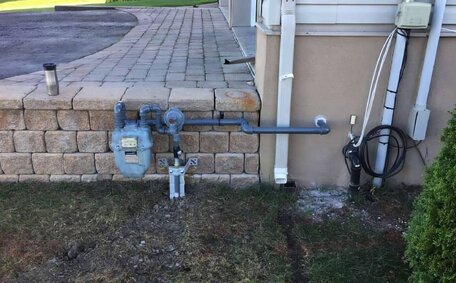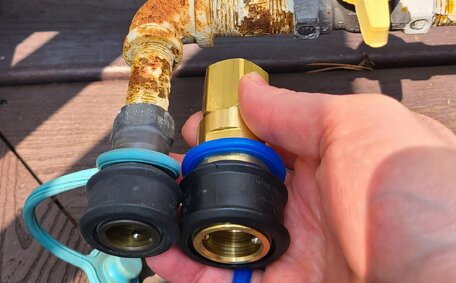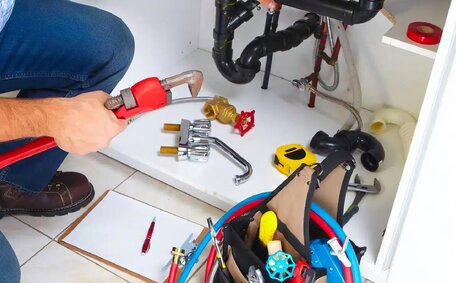Introduction to mould and mildew
Mould and mildew are types of fungi that thrive in damp and humid areas. With their fuzzy, web-like appearance, mould and mildew can be an alarming sight in your home. Mould and mildew are commonly found growing on walls, ceilings, bathroom grout, showers, and other moist surfaces. If left unchecked, mould and mildew can lead to a number of problems.
Mould and mildew growth is often caused by excess moisture and inadequate ventilation. Leaky pipes, dripping taps, high indoor humidity, and poor air circulation allow mould and mildew to flourish. Standing water from leaks, floods or heavy condensation also enables mould and mildew to take hold.
Preventing mould and mildew involves eliminating moisture and improving air flow. Fixing leaky plumbing, increasing ventilation, using exhaust fans, and dehumidifiers can help stop mould and mildew from forming in the first place. With regular plumbing maintenance and prompt repairs for any water damage, the growth of mould and mildew can be avoided.
Health hazards of mould and mildew
Exposure to mould and mildew can cause a number of health issues, especially for those with allergies or asthma. Inhaling the spores from mould and mildew growth can trigger allergic reactions, asthma attacks, and other respiratory problems.
Some of the common health effects of mould exposure include nasal congestion, runny nose, irritated eyes, wheezing, skin rashes, and headaches. Mould spores can also exacerbate chronic conditions like allergies and asthma. People with weakened immune systems are particularly vulnerable to illnesses caused by mould.
In rare cases, exposure to toxic mould found in damp buildings can lead to more serious respiratory infections. Toxic moulds like black mould release mycotoxins that can cause fever, shortness of breath, and lung infections when inhaled in large amounts.
That’s why it’s critical to address any moisture issues that allow mould to grow. Getting rid of excess moisture and fixing plumbing leaks prevents mould growth and protects your health. Your local plumber can help identify and resolve plumbing problems that contribute to mould formation.
Causes of mould and mildew growth
There are several common causes that lead to mould and mildew growth in your bathroom and other areas of your home.
Leaks and water damage from faulty plumbing are major contributors to mould growth. Dripping taps, leaking pipes under sinks or in walls, and cracks in shower grouting allow water to seep into crevices and feed mould.
Condensation on cold surfaces like windows and tile also provides the perfect damp environment for mould and mildew. This is exacerbated by poor ventilation that allows moisture to linger.
Other causes include flooding from broken appliances like hot water systems, rainwater leaks, and broken drainage. Stagnant water from plumbing blockages and clogged drains can also lead to mould if not addressed promptly.
By stopping moisture at its source through proactive plumbing maintenance and repairs, conditions that enable mould and mildew to thrive can be eliminated. Your local plumber can inspect your bathroom and home’s plumbing to identify and resolve any issues that may be causing mould growth.
Leaky plumbing and pipes
Leaky pipes and plumbing issues are a major cause of water damage that can lead to mould and mildew growth in your home. Small drips from taps, cracks in pipes, and pinhole leaks may seem harmless at first. But over time, they can cause moisture to accumulate in walls, under sinks, and other hidden areas.
This excess moisture seeping into crevices creates the damp environment where mould and mildew thrive. If undetected, prolonged leaks from plumbing can cause mould and mildew to spread extensively, posing health risks and requiring major repairs.
Fixing plumbing issues and improving ventilation can help prevent mould and mildew growth. Regular plumbing inspections can help identify and fix plumbing issues that contribute to mould and mildew problems before they escalate. Your plumber can check for leaky pipes, dripping taps, and signs of water damage during maintenance.
Prompt repairs by a professional plumber are recommended at the first sign of any leaks. Replacing worn washers, sealing pipe cracks, and stopping drips minimises moisture and removes the conditions enabling mould and mildew growth.
With vigilant plumbing maintenance and immediate fixes for leaks, you can stop moisture at its source. Preventing water damage protects your home and health by keeping mould and mildew from gaining a foothold.
Poor ventilation
Poor ventilation is a key factor that allows mould and mildew to thrive, especially in humid areas like your shower and bathroom. Stagnant, moist air provides an ideal environment for mould and mildew growth.
Preventing mildew and mould in the bathroom can be done by improving air ventilation, keeping it clean, and drying damp surfaces. Simple fixes like opening windows, running exhaust fans during and after showering, and using dehumidifiers can reduce moisture in the air.
It’s also important to promptly fix any plumbing leaks and clear blockages that allow water to accumulate. Your local plumber can help improve ventilation by identifying and repairing any issues causing condensation buildup.
With proper ventilation and plumbing maintenance, you can remove excess moisture that enables mould and mildew growth in your bathroom. Keeping the air circulating prevents the damp, humid conditions these fungi need to spread.
Moisture buildup
Consistent moisture in hidden areas of your home can lead to serious mould and mildew problems. Small amounts of moisture from condensation, plumbing leaks, or water damage that goes unchecked can enable mould and mildew growth in walls, under floors, and other concealed spaces.
Even if you don’t see any visible mould on surfaces, moisture trapped in enclosed areas allows mould and mildew to thrive out of sight. Prolonged exposure to moisture allows mould colonies to rapidly expand, spreading spores through HVAC systems.
Keeping surfaces dry and improving air ventilation helps prevent mould and mildew growth. Regular inspections by your plumber can identify plumbing leaks or other moisture issues in walls, attics, basements, and crawl spaces before mould takes hold.
Your plumber can also recommend and install ventilation improvements like exhaust fans, dehumidifiers, and air sealing that reduce humidity levels and moisture buildup indoors. Detecting and fixing moisture problems quickly prevents concealed mould infestations that can damage your home and health.
Preventing mould and mildew
There are several effective preventive measures that can help stop the growth of mould and mildew in your home.
Improving ventilation is key. Using exhaust fans, opening windows regularly, and running dehumidifiers helps reduce humidity and moisture - conditions that mould and mildew need to thrive.
It’s also important to act quickly at the first sign of any water leaks or flooding. Promptly fixing plumbing problems prevents moisture from seeping in and feeding mould growth.
Regular inspections by a professional plumber can identify issues like leaky pipes or poor drainage before they cause bigger problems. Annual plumbing check-ups are recommended.
Preventive measures such as improving air ventilation and keeping surfaces dry can help stop mould and mildew growth. Controlling humidity, fixing leaks immediately, and cleaning mould prone areas prevents these stubborn organisms from taking hold in your home.
Safe removal of existing mould and mildew
If you discover mould or mildew in your home, it’s important to remove it safely and effectively. There are various methods to remove mould and mildew, including using chemical cleaners or home remedies.
Cleaning with chemical cleaners or home remedies like vinegar can help remove mould and mildew from non-porous surfaces like tiles or bathtubs. Always ensure adequate ventilation and follow all safety precautions when using chemical cleaners.
For more extensive mould removal, professional services may be required. Licenced plumbers and mould remediation specialists employ techniques like containment, high-efficiency air scrubbing, and antimicrobial treatments to thoroughly eliminate mould and prevent recurrence.
Professionals have specialised tools, protective gear, and expertise to remove mould on porous surfaces, inside walls and HVAC systems safely. They can also identify and fix underlying causes like plumbing leaks to prevent regrowth.
Whether doing DIY cleaning or hiring professionals, it’s vital to completely dry affected areas and improve ventilation to make the environment less hospitable to mould. Address plumbing leaks immediately and maintain humidity levels below 50 percent.
With prompt, safe mould removal and moisture control, you can protect your home from further damage. Regular plumbing inspections to identify and fix leak issues also helps prevent mould from recurring.
Conclusion
Mould and mildew can pose serious hazards, but there are ways to prevent these stubborn fungi from taking hold in your home. With proactive plumbing maintenance, prompt leak repairs, ventilation improvements, and controlling moisture, you can stop conditions that allow mould and mildew to thrive.
Regular inspections by licenced plumbers like Marsfield Plumbing based in Marsfield, Sydney, are key to identifying issues early before mould and mildew problems start. Don’t wait until you see mould visibly growing - minor leaks and humidity can still enable hidden mould growth in walls and other enclosed spaces over time.
Make sure to act at the first signs of plumbing leaks or moisture issues. Improve ventilation, fix drips immediately, and dry damp surfaces to ensure your home stays mould-free. Stopping moisture damage protects your family’s health and prevents the need for costly mould remediation down the track.
With vigilant plumbing upkeep and repairs for any water leaks or damage, you can maintain a dry, well-ventilated home safe from the infiltration of mould and mildew.






